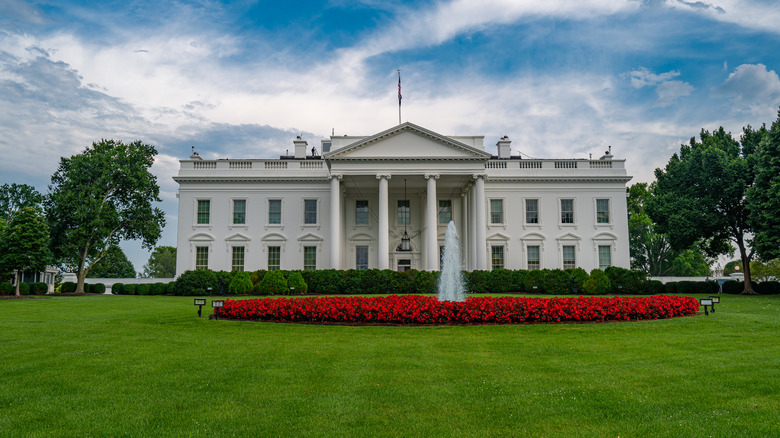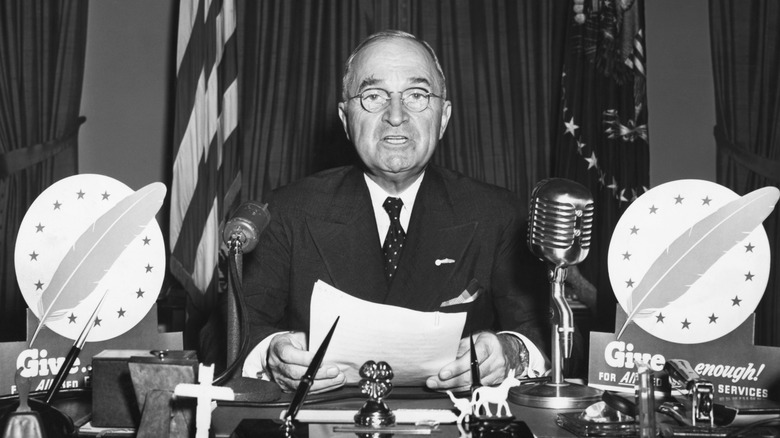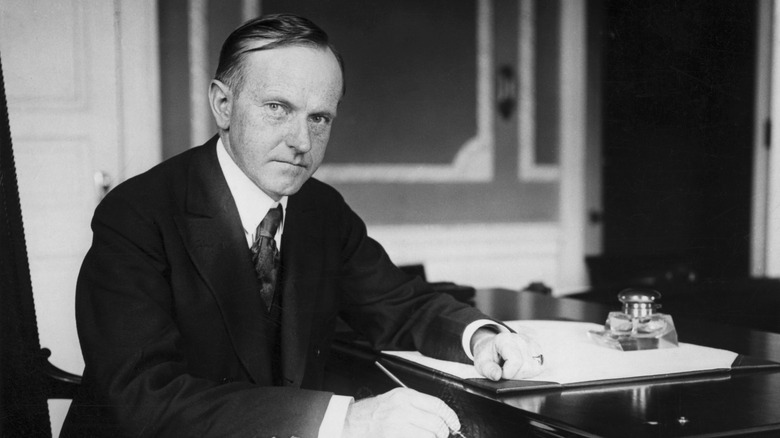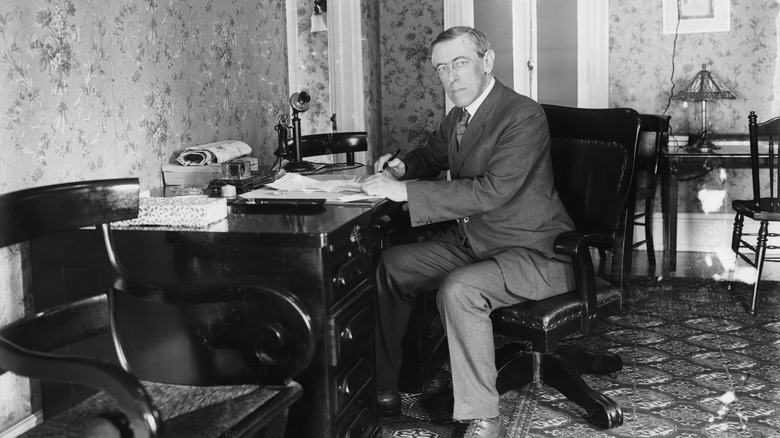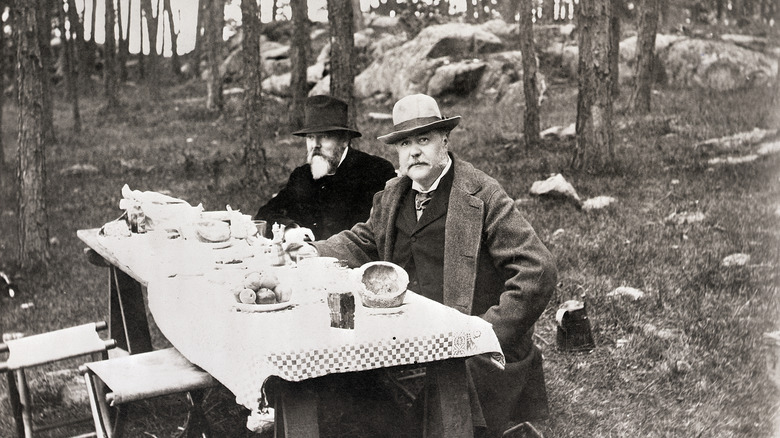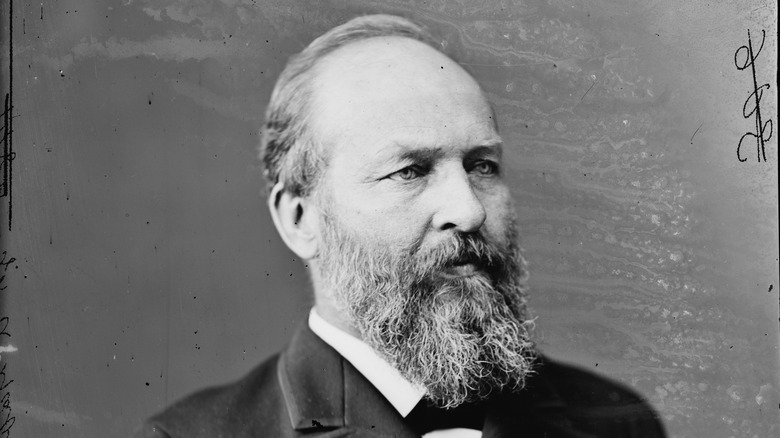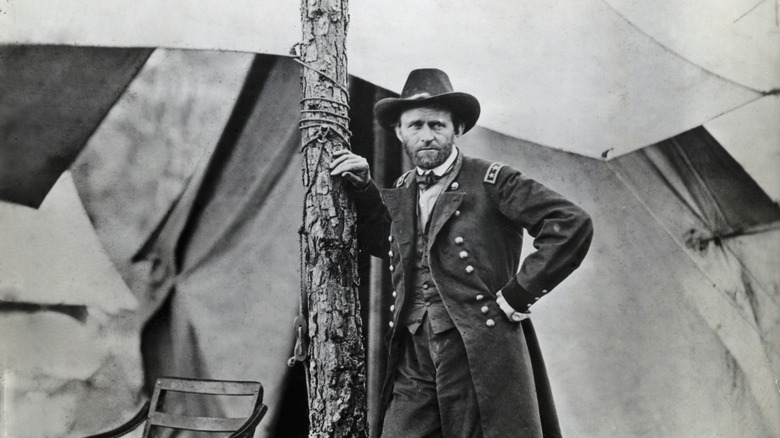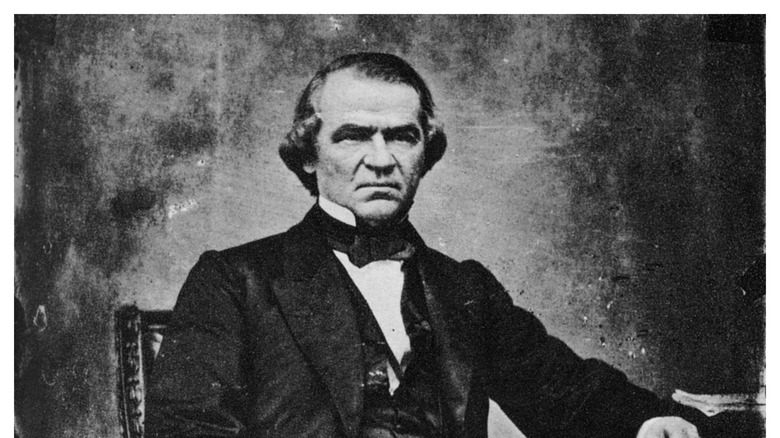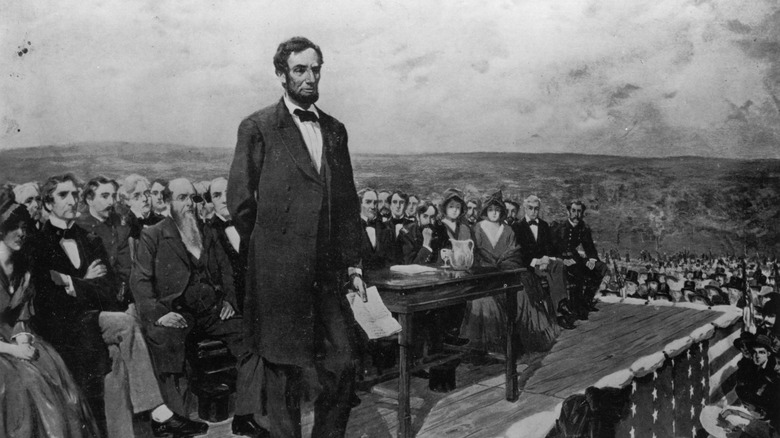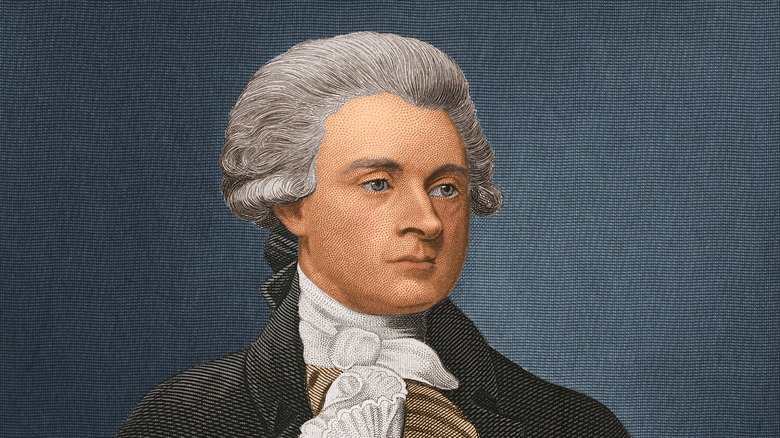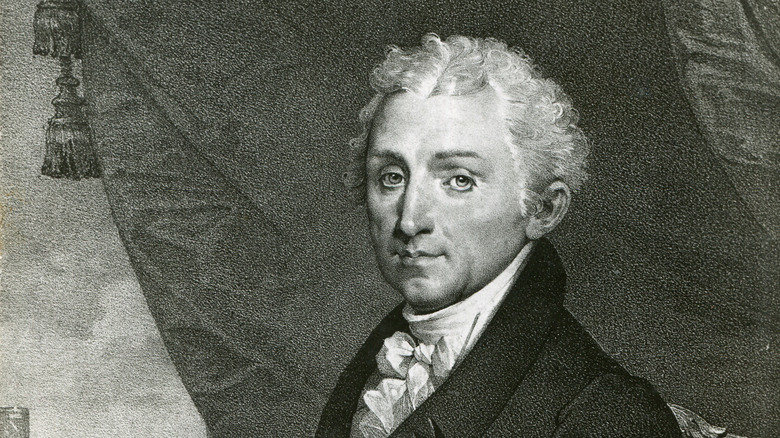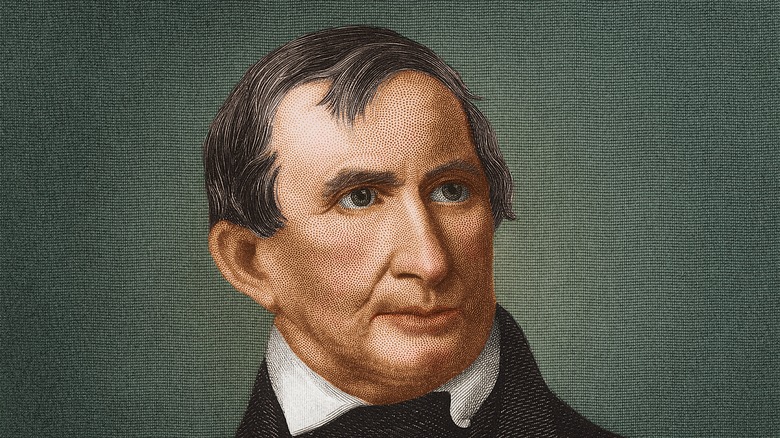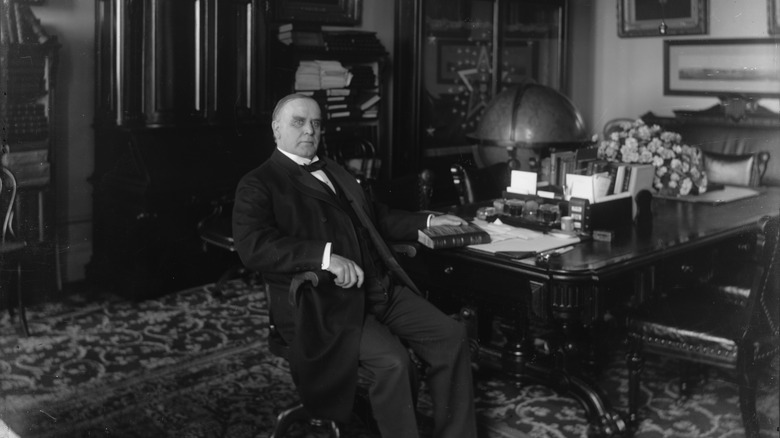The 12 Poorest Presidents In US History
Over the past few years, the role of public office has been associated with extreme wealth and celebrity status. It's not uncommon for politicians to leave office with way more money than can be explained by their paycheck, complete with a book deal and Netflix documentary. According to Pew Research, 64% of Americans believe people only run for office to become wealthy. In truth, federal and state representatives often earn a decent living on paper — well beyond the average U.S. household income — but their real financial success comes from extracurricular activities, such as speaking gigs, lobbying pushes, and even insider trading. While this rings true for senators and other representatives, no position in the United States government is connected with more prosperity than the president.
Officially, the POTUS receives an annual salary of $400,000, up from $25,000 when George Washington assumed office as America's first president. Despite many offering to forgo their salaries for a good cause, the past few presidents have left the office insanely wealthy. The average net worth of presidents since 2018 is a staggering $25 million. President Donald J. Trump blows this average figure out of the water, adding $1.6 billion to his net worth during his first term and $850 million from cryptocurrency alone in his second, according to Citizens for Ethics. The past few decades of U.S. leaders have controversially left with sizable net worths, but this wasn't always the story of the American presidency. Several leading gentlemen were born without a silver spoon in their mouths.
Harry Truman
Harry S. Truman is commonly described as the "poorest president to enter office in modern history," according to Investopedia. Although the president ended his life ahead of the average American, Truman's early life and time in public office were marred by financial challenges. The Truman family consisted of rural farmers in Missouri who did not have much to their name. With no clear professional direction, Truman joined the military, signaling his future commitment to public service. However, before jumping into politics, his entrepreneurial urge led to the opening of a men's clothing company. Unfortunately, the business drained Truman's modest savings, leaving him almost broke.
Upon entering public office as a local judge and eventually the president, Truman's financial stability improved, but not dramatically. When he left office, Truman bemoaned to CBS News that the government "turns its chief executives out to grass," opining on the lack of financial support provided to ex-presidents. Eventually, the Truman family was able to capitalize on their name with his popular memoirs in 1954. From those book sales, the former president earned over $6 million in today's value. That's more than the amount of money you need in your savings to retire rich.
Calvin Coolidge
Born John Calvin Coolidge, the future president tended to his family's shop throughout much of his early life. Oblivious to his future career in public office, young Coolidge didn't have any desire to venture out into the broader world, preferring a life on his family's farm as a local shopkeeper. Eventually, Silent Cal — a nickname inspired by his silent resoluteness — earned his license to practice law and started a small practice, maintaining a modest salary. The Library of Congress stresses how Coolidge carried this identity as a small-town, thrifty, everyday man throughout his presidency, easily connecting with the average American who struggled with daily finances.
Coolidge brought this innate frugality from his upbringing to the presidency, focusing on improving government operations while cutting back on spending. The Vermont farmer and shopkeeper turned POTUS made an effort to slash taxes to promote economic growth, trim excess budgetary fat, and put a dent in the rising national debt. To this day, Coolidge remains the last president to actually reduce the size and spending of the federal government. After his presidency, Coolidge stayed out of the wealth-generating limelight, focusing on his writing instead of national fanfare. While better off than his upbringing, Coolidge did not die as one of the richest U.S. presidents of all time.
Woodrow Wilson
Woodrow Wilson came from humble beginnings, growing up in the chaotic South during the Civil War and Reconstruction eras. This challenging economic backdrop set the scene for the Wilson family's financial grounding. His Presbyterian father earned a modest living, although he was arguably better off than farming families from the same region. Woodrow Wilson is believed by historians to have suffered from a learning disability due to his struggles in school. However, his father's focus on teaching his son oratory skills may have provided the rhetorical flourish that helped Wilson rise in the ranks of public office.
Despite his learning challenges, Wilson became the first president to earn a doctoral degree, obtaining a Ph.D. in political science. He spent most of his professional life in academia, which paid meagerly at the time. Launching his political career from the New Jersey Governor to the U.S. President, Wilson had an opportunity to accumulate the wealth he never knew in his childhood. Yet, major health complications befell the president shortly after leaving office. In fact, his home in Washington, D.C., was bought by wealthy benefactors. To be fair, Wilson earned much less in office than how much money the president of the U.S. really makes today.
Chester A. Arthur
Chester A. Arthur was the son of recent Irish immigrants who fled their homeland before the potato famine wiped out a considerable amount of income opportunities and a solid chunk of the country's food supply. The one-generation leap from European refugees to the U.S. presidency embodies the American Dream, but this considerable accomplishment wasn't achieved without hardship. The Arthur family grew up in modest conditions in Fairfield, Vermont. Similar to other presidents, he was born in a log cabin to a large family. The family's meager income had to be spread out among eight children and two parents.
Instead of hopping right into politics, Chester followed in his father's footsteps by pursuing a career in social service rather than a profitable career in the private sector. Following several years of teaching in schools in the Northeast, Arthur decided to launch his own law practice. Instead of being elected to the presidency like many on this list of the poorest U.S. presidents, Arthur was nominated as vice president. He only became the Commander-in-Chief after the tragic assassination of James Garfield. Congress entrusted Arthur with decent funds to improve the White House, but he ended up passing away with a meager fortune.
James A. Garfield
Born James Abraham Garfield, the future president was born to a frontier family, according to the Miller Center, similar to many of the other poorest heads of state in U.S. history. His father passed away when Garfield was an infant, so his mother was the sole provider for the family. With three children to care for, the matriarch struggled to stay out of poverty. Garfield helped his mother work on their farm on the outskirts of Cleveland, Ohio. When he turned 16, he took a trade job moving shipments to and from Pittsburgh and his hometown of Cleveland. The occupation didn't agree with Garfield, who fell overboard more than a dozen times, eventually forcing a return to the farm.
Over the next few decades, Garfield held a string of low-paying, service-oriented jobs, such as a teacher, minister, and even janitor. Instead of relying on a wealthy family fortune or a famous last name to fund his way through higher education, Garfield paid his own way. At the Eclectic Institute in Ohio, he became one of the most senior students to attend.
Ulysses S. Grant
Ulysses S. Grant is perhaps more well-known as the military leader of the North, leading and eventually winning the Civil War against the secessionist South. However, Grant also served as the Commander-in-Chief following the internecine conflict. Despite these numerous accolades and accomplishments, the famed military genius knew economic hardship throughout his life, according to History.com. Before his rise to prominence, Grant struggled to make a living wage, bouncing between odd jobs as a farmer and rent collector, among others. At one point, the future president was stuck selling firewood in St. Louis, residing at a dilapidated log cabin he called "Hardscrabble."
Grant's net worth improved significantly throughout his presidency, between 1869 and 1877, yet the economic fortune didn't last long. In 1884, Grant invested the majority of his amassed wealth into a single investment firm. Within one day, the ex-president went from extreme wealth, compared to the average American, to abject poverty. In the end, Grant and his wife only had around $200 to their names. Following the president's death, his friend Mark Twain, an iconic American novelist, helped sell the Personal Memoirs of Ulysses S. Grant. With the assistance of door-to-door salespeople, Twain helped provide Grant's widow with over $12 million in today's dollars.
Andrew Johnson
Andrew Johnson assumed the presidency following the harrowing assassination of Abraham Lincoln. Similar to his successor, Johnson grew up in extreme poverty. His mother labored as a laundress, and his father worked as a porter at a local hotel. Despite these two incomes, money was scarce at the modest Johnson household in Raleigh. The family was so financially strapped that Johnson and his sister often went to bed hungry as their parents struggled to afford sufficient food. To make matters worse, Johnson's father passed away when he was only three, leaving his mother to fend for herself financially.
Johnson eventually earned an apprenticeship at a local tailor, to which he was legally bound until he turned 21. Disillusioned with the position, the future president ran away with his family to establish his own business in Greeneville. Johnson's financial struggles continued well into his marriage to the point that his wife became his primary financier, according to White House History. Furthermore, she taught him how to read since he had never formally attended school. Eventually, Johnson's fiscal situation improved dramatically as the illiterate tailor eventually became a learned politician and president of the U.S.
Abraham Lincoln
One of the most popular and celebrated presidents in U.S. history happened to have one of the toughest and most financially challenged backgrounds, according to HIstory.com. Abraham Lincoln describes his early years as "the short and simple annals of the poor." At the time, his birthplace and childhood homes of Illinois, Indiana, and Kentucky were along the frontier of the relatively young and ever-expanding country of the U.S. While most pioneers and farmers pushing the nation's borders were poor, historian Michael Burlingame, stresses the unique poverty experienced by the Lincoln's, saying their life was "little better than the life of an ox."
The entire family slept within a tiny cabin on a dirt floor. Beyond meager financial origins, the future 16th president also worked tirelessly throughout his early life. His father, Thomas, had his son work on the farm when he was only six, tilling the land, cleaning, and picking fruits and seeds, among other farm-related tasks. Following the death of his mother, more of the quotidian household chores fell on Lincoln's shoulders. Lincoln earned a decent living after assuming the presidency, yet his income didn't come close to the average net worth of modern U.S. presidents.
Thomas Jefferson
If you remember anything from 5th-grade history class, you might be surprised to see Thomas Jefferson on the list of the poorest presidents in U.S. history. After all, he was a fairly successful landowner before becoming president. However, the American Founding Father was actually born into a tremendous amount of debt. His father-in-law racked up considerable debt, which was transferred to Jefferson following his death. Instead of judiciously managing his wealth to pay off this debt, Jefferson was a spendthrift. Even before becoming president, he was known for his penchant for expensive things, routinely upgrading his Monticello home.
When serving as the third president, Jefferson continued his prolific spending, famously blowing $10,000 on expensive wine, according to Consumer Credit. For reference, that comes out to $150,000 in modern dollars. It can't be said that all of Jefferson's questionable spending was for himself. The president cosigned on a friend's loan for $20,000. Similar to his father-in-law, Jefferson's friend passed away, placing the financial burden fully on the president. In the end, Jefferson died more than $100,000 in debt, or around $2 million in today's value.
James Monroe
Unlike other poor presidents who achieved financial independence after being born into poverty, James Monroe took the opposite trajectory. He was born into a wealthy plantation-owning family, according to the Miller Center. Furthermore, his parents bequeathed their small fortune to their children after their passing. The inheritance included a sizable amount of money, an entire plantation, and many slaves. Monroe became a pivotal figure in the American Revolution and eventually entered politics, coming under the wing of Thomas Jefferson. Monroe's professional path took him into local legal practice before propelling him to the presidency, but his economic fortune wouldn't last.
John Adams, the second president of the U.S., described James Monroe's final years as a period of "wretchedness and beggary." Despite earning a respectable income for years as the Commander-in-Chief, Monroe struggled to make ends meet financially. He failed to sustainably operate his sizable plantation, eventually destroying what should have been a profitable enterprise. Facing economic ruin, the ex-president petitioned Congress for funds to help pay off some of the debt accumulation. Despite being given a $30,000 taxpayer-funded handout, Monroe still failed to manage financially and ended up moving in with his children in his old age.
William Henry Harrison
William Henry Harrison achieved many unenviable accolades as the ninth U.S. president. He was the first Commander-in-Chief to die in office. After falling ill with pneumonia, he died after only a month in office, becoming the shortest-serving president — a title he still holds to this day. Perhaps the most embarrassing superlative is that Harrison squandered one of the strongest financial upbringings in presidential history. Born to a signatory of the Declaration of Independence, Harrison grew up on the Berkeley Plantation, an insanely prosperous plantation in Virginia. This vast wealth ensured Harrison had the best education possible. Throughout his time in office, campaigns attempted to frame his upbringing as a lower-class, frontiersman experience, although that was far from reality.
Following his father's death, Harrison's financial trajectory took a nosedive. Failing to fund his own education, the future president left school to join the military. Although this helped propel him to political fame, his rearing of 10 children only exacerbated his financial hurdles. As the ambassador of Columbia, Harrison faced bankruptcy all the while his sons were destroying what was once the most profitable plantation in the region. When he passed away, only a few weeks after moving into the White House, his net worth was near zero.
William McKinley
Among the poorest presidents in U.S. history, William McKinley stands out as having the most volatile financial background, according to the Miller Center, gaining and losing substantial sums several times throughout his life. Born the seventh of eight kids, McKinley was born into a religious family of modest means. Although he was provided a formal education at a seminary and eventually a college in Pennsylvania, economic challenges forced him to leave early. After serving in the Civil War, McKinley got his political start, eventually serving as a county prosecutor and Congressional representative before becoming the Ohio governor.
Unfortunately, McKinley's financial woes came back to haunt him in the midst of the Great Depression. Similar to Grant, McKinley's fiscal downfall was co-signing a loan for a friend. Rober Walker put the money into a tin plate business, which went belly up shortly after the investment. Facing $130,000 of debt, McKinley's financial future looked bleak. Although that was a considerable amount of money for the time, it pales in comparison to the many times Donald Trump went into bankruptcy. Similar to Trump, McKinley eventually recovered, but only with the help of supporters and donors. When McKinley assumed the presidency, his financial struggles were behind him.
